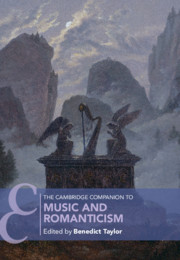Book contents
- The Cambridge Companion to Music and Romanticism
- Cambridge Companions to Music
- The Cambridge Companion to Music and Romanticism
- Copyright page
- Contents
- Figures
- Tables
- Musical Examples
- Contributors
- Preface
- Chronology
- Part I Horizons
- Part II Worlds
- Part III Aesthetics
- 10 Music in Early German Romantic Philosophy
- 11 Meaning and Value in Romantic Musical Aesthetics
- 12 Music and Romantic Interiority
- 13 Music, Expression, and the Aesthetics of Authenticity
- Part IV Practices
- Part V Histories
- Select Bibliography
- Index
- References
11 - Meaning and Value in Romantic Musical Aesthetics
from Part III - Aesthetics
Published online by Cambridge University Press: 06 August 2021
- The Cambridge Companion to Music and Romanticism
- Cambridge Companions to Music
- The Cambridge Companion to Music and Romanticism
- Copyright page
- Contents
- Figures
- Tables
- Musical Examples
- Contributors
- Preface
- Chronology
- Part I Horizons
- Part II Worlds
- Part III Aesthetics
- 10 Music in Early German Romantic Philosophy
- 11 Meaning and Value in Romantic Musical Aesthetics
- 12 Music and Romantic Interiority
- 13 Music, Expression, and the Aesthetics of Authenticity
- Part IV Practices
- Part V Histories
- Select Bibliography
- Index
- References
Summary
In the first half of the nineteenth century, changes in philosophy and aesthetics as well as the increasing prominence of ‘pure’ instrumental music brought to a head questions over the meaning and value of music. While the merit of most of the fine arts (literature, painting, sculpture) was beyond serious doubt, instrumental music’s supposed lack of content posed a peculiar problem to writers. This chapter presents four main Romantic strategies used to argue for music’s meaning, including the use of programmes as well as the rethinking of the relations between music and feeling, music and words, and between content and form. Covering the first half of the nineteenth century, it encompasses the view of philosophers and composers as well as writers and critics, from Schopenhauer, Hoffmann, and Tieck to Mendelssohn, Schumann, Wagner, Brendel, and Hanslick.
- Type
- Chapter
- Information
- The Cambridge Companion to Music and Romanticism , pp. 183 - 198Publisher: Cambridge University PressPrint publication year: 2021



